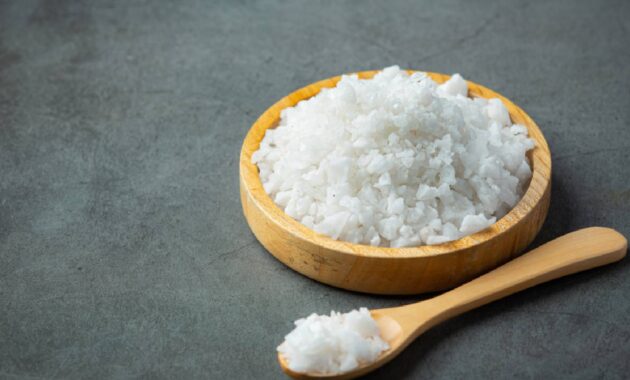Epsom salt has a host of health benfits including pain relief, constipation cure as well as many haircare and skincare uses.
Be it pain relief, skin care, hair care or treating anxiety and stress, Epsom salt is your one-stop solution. Epsom salt is a mineral compound composed of magnesium, sulfur, and oxygen. Therefore, it can take the form of an effective bath salt, a health supplement or something to relax those muscles.
However, while Epsom salt has a host of health benefits, it needs to be used with caution as there are some side effects associated with this compound as well. Health Shots got in touch with dietician Kejal Shah and dermatologist Dr Priyanka Kuri to understand how the use of Epsom salt can help us, as well as the side effects associated with it.
What is Epsom salt?
Epsom salt is another name for magnesium sulphate. Magnesium is a mineral that we don’t get enough of in our daily diets, and hence, Epsom salt helps us get the required amount. While it is chemical in nature, it is very different from the regular table salt that we use on a daily basis. In fact, it is very bitter in taste and this is why most people hesitate from adding it to food.

How does Epsom salt work?
Epsom salt works by being absorbed into the body or plants and providing magnesium and sulfate ions. “In the body, magnesium is essential for various enzymatic reactions and plays a role in nerve and muscle function, while sulfate aids in detoxification processes. Additionally, the presence of these ions can help to reduce inflammation and promote relaxation when used in baths or skincare products,” explains Shah.
Also Read

Benefits of Epsom salt
There are a variety of benefits associated with the use of epsom salt.
1. Muscle relaxation
Epsom salt can help relax and soothe sore muscles by increasing magnesium levels in the body. Magnesium plays a crucial role in muscle function, and its deficiency can contribute to muscle cramps and tension.

Healthshots Inner Circle An exclusive wellness community for women
JOIN NOW
2. Pain relief
The anti-inflammatory properties of Epsom salt can provide relief from various types of pain, including muscle aches, joint pain, and headaches. It can help reduce inflammation and swellings, promoting comfort and alleviating discomfort.
Select Topics of your interest and let us customize your feed.
PERSONALISE NOW
Also Read: Want to feel fresh as a daisy? Take a saltwater bath and relax your mind and body
3. Stress and anxiety reduction
The magnesium in Epsom salt can help promote relaxation and calmness. It can aid in reducing stress levels and alleviating anxiety by regulating neurotransmitters that promote relaxation.
4. Hair and skin benefits
An Epsom salt bath can be soothing, reducing inflammation, and softening your skin. Soaking feet in hot water with Epsom salt is beneficial when it comes to treating fungal infections. It can be used in dry skin conditions like psoriasis and atopic conditions. For hair, dissolving Epsom salt in water and using it as a mask may help remove excess oil and product build-up. You can also create an exfoliating scrub by mixing Epsom salt with a carrier oil, promoting circulation and removing dead skin cells.
Can you eat Epsom salt?
It is not recommended to include Epsom salt in your diet without consulting a healthcare professional. While Epsom salt is used as a laxative, it is primarily intended for external use, such as in baths or skincare products. “If you are thinking of using Epsom salt orally, you must consult a doctor, who can provide appropriate guidance on dosage and usage,” says Shah.
Also Read: Sitz bath: An effective home remedy for vaginal itching
How to use Epsom salt for skin and hair?
Here are some ways to use Epsom Salt for skin and hair:
1. Epsom salt bath
For your skin, dissolve Epsom salt in warm bathwater and soak to potentially soothe sore muscles, reduce inflammation, and soften the skin. For your hair, you can also dissolve Epsom salt in water and use it as a hair mask. This may help remove excess oil and product buildup from the scalp.
2. Exfoliating scrub
Mix Epsom salt with a carrier oil (like coconut or olive oil) to create an exfoliating scrub. Gently massage it onto wet skin to remove dead skin cells and promote circulation. A similar mixture can be applied to the scalp to exfoliate and improve overall scalp health.

3. Hair volumizer
Combine Epsom salt with your conditioner to create a volumizing hair treatment. Apply this mixture to your hair, leave it on for a few minutes, and then rinse thoroughly.
What are the side effects of Epsom salt?
While Epsom salt is generally safe for most individuals, it may cause side effects in some cases.
1. Diarrhea
Taking Epsom salt orally or in excessive amounts can lead to diarrhea due to its laxative effect.
2. Dehydration
Diarrhea caused by Epsom salt can lead to dehydration, especially if not enough fluids are consumed to replenish the lost fluids.
3. Skin irritation
Some individuals may experience skin irritation or allergic reactions when using Epsom salt in baths or skincare products. It is advisable to perform a patch test before applying it to larger areas of the skin.
4. Magnesium toxicity
Overuse or excessive ingestion of Epsom salt can lead to elevated magnesium levels in the body, resulting in symptoms such as nausea, dizziness, low blood pressure, and irregular heartbeats.
5. Drug interactions
Epsom salt may interact with certain medications, such as antibiotics, diuretics, and anticoagulants. It is important to consult with a healthcare professional before using Epsom salt if on any medication.
#Epsom #Salt #Benefits
